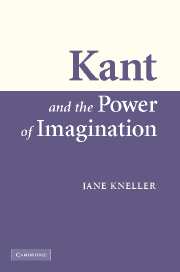Book contents
- Frontmatter
- Contents
- Preface and acknowledgments
- Introduction
- 1 Kant and Romanticism
- 2 The power of imaginative freedom
- 3 The interests of disinterest
- 4 Aesthetic reflection and the primacy of the practical
- 5 The failure of Kant's imagination
- 6 Imaginative reflections of the self in Novalis and Hölderlin
- 7 Novalis' Kantianism and Kant's Romanticism
- Bibliography
- Index
7 - Novalis' Kantianism and Kant's Romanticism
Published online by Cambridge University Press: 22 September 2009
- Frontmatter
- Contents
- Preface and acknowledgments
- Introduction
- 1 Kant and Romanticism
- 2 The power of imaginative freedom
- 3 The interests of disinterest
- 4 Aesthetic reflection and the primacy of the practical
- 5 The failure of Kant's imagination
- 6 Imaginative reflections of the self in Novalis and Hölderlin
- 7 Novalis' Kantianism and Kant's Romanticism
- Bibliography
- Index
Summary
Doch das Paradies is verriegelt und der Cherub hinter uns; wir müssen die Reise um die Welt machen, und sehen, ob es vielleicht von hinten irgendwo wieder offen ist.
(Kleist, “Über das Marionetten Theater” (On the Marionette Theater)) (Paradise is barred and the cherub behind us; we must travel around the world, and see if maybe somewhere it is open again from the back.)
Kleist summed up the mix of awe and profound disappointment that many intellectuals in the 1780s and 1790s must have felt in the wake of Kant's philosophy. For although in it human cognitive activity takes on new constitutive powers that define the boundaries of the real, the cost of shifting this constitutive power to human subjectivity was high: loss of access to a world beyond appearances. In spite of Kant's claim to have made “room for faith,” knowledge of the world of things “in themselves” was barred, so it seemed, once and for all. In his fictional essay “On the Marionette Theater,” Kleist frames the philosophical problem of knowledge as a problem within the context of performance art. His narrator interviews a renowned dancer who aims to move with absolute grace across the floor, freely and without alienation, but recognizes that the impossibility of achieving his goal is rooted in self-consciousness. The great dancer tells Kleist's narrator that the artist should look to the marionette as a model of unselfconscious expression of absolute, unalienated movement.
- Type
- Chapter
- Information
- Kant and the Power of Imagination , pp. 139 - 160Publisher: Cambridge University PressPrint publication year: 2007



